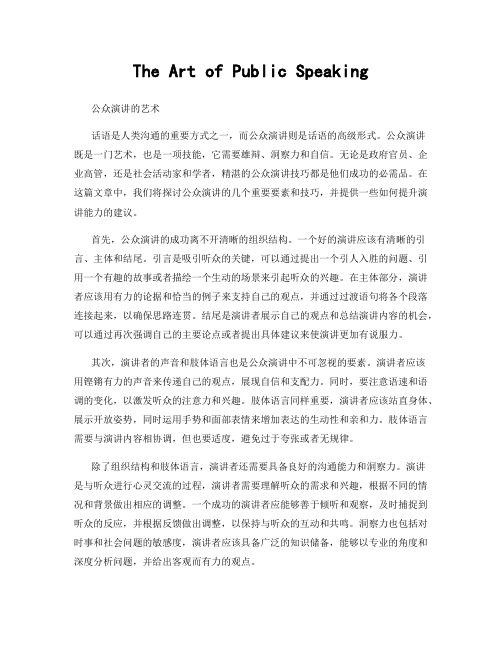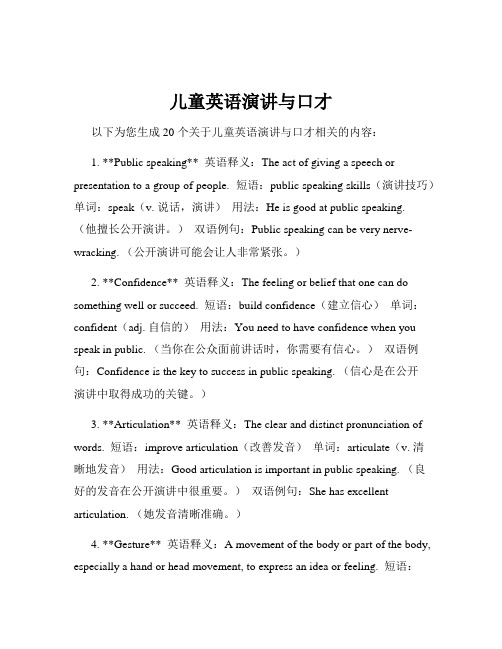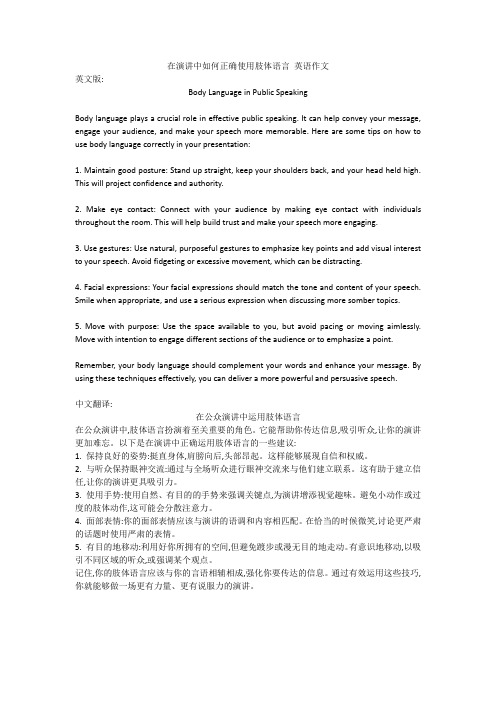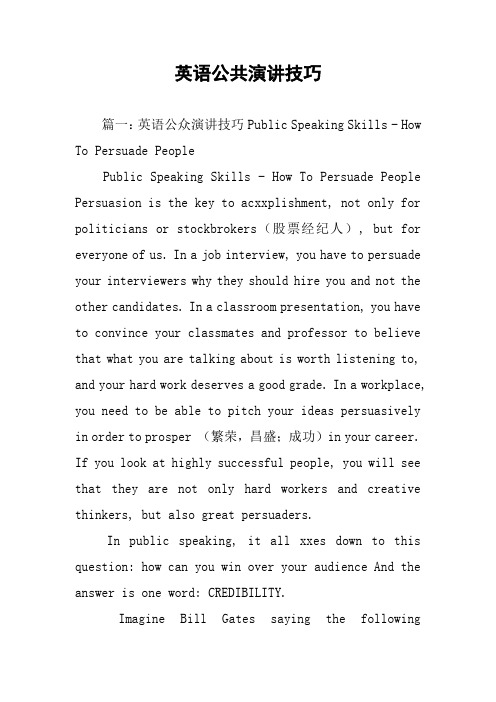英语公众演讲技巧Public Speaking Skills - How To Persuade People
英语公共演讲的技巧

英语公共演讲的技巧1.微笑并看着观众Smile and glance at the audience;2.开始发言时要慢一点,身体保持昂首挺胸的姿态Start very slowly, with your shoulders back and your chin up;3.对自己说一些积极的话Say something positive to yourself;4.注意声调,要有感情Watch your emotional tone;5.动之以情To touch emotions;6.眼睛直视听众,或看着他们的鼻梁或下巴Look at people straight or look at the bridge of their noses or chins;7.保证自己充分了解在活动中的角色Make sure you fully understand your role in the program;8.认真地构思演讲,使其结构符合逻辑Devote care to structuring your speech logically.英语公开演讲的禁忌1. 语速太快 Talking too rapidly;2. 声音单调 Speaking in monotone;3. 声音尖细 Using too high a vocal pitch;4. 谈得太多,说得太少Talking and not saying much;5. 感情不充分Presenting without enough emotion or passion;6. 对观众采取一种居高临下的姿态Talking down to the audience;7. 夸张的词语使用得太多Using too many "big" words;8. 使用抽象概念而不给出事例加以说明Using abstractions without giving concrete examples;9. 使用别人不熟悉的技术术语Using unfamiliar technical jargon;10. 使用俚语或粗俗语Using slang or profanity;11. 演讲无组织,散乱无序Disorganized and rambling performance;12. 说话绕弯子,不切中主题Indirect communication , beating around the bush.英语公开演讲的“三的法则”1. 你的演讲包含三个部分The beginning, the middle and the end. Start to plan out what you will do in these three parts. The beginning is ideal for an attention grabber or for an ice breaker. The end is great to wrap things up or to end with a grand finale。
The Art of Public Speaking

The Art of Public Speaking 公众演讲的艺术话语是人类沟通的重要方式之一,而公众演讲则是话语的高级形式。
公众演讲既是一门艺术,也是一项技能,它需要雄辩、洞察力和自信。
无论是政府官员、企业高管,还是社会活动家和学者,精湛的公众演讲技巧都是他们成功的必需品。
在这篇文章中,我们将探讨公众演讲的几个重要要素和技巧,并提供一些如何提升演讲能力的建议。
首先,公众演讲的成功离不开清晰的组织结构。
一个好的演讲应该有清晰的引言、主体和结尾。
引言是吸引听众的关键,可以通过提出一个引人入胜的问题、引用一个有趣的故事或者描绘一个生动的场景来引起听众的兴趣。
在主体部分,演讲者应该用有力的论据和恰当的例子来支持自己的观点,并通过过渡语句将各个段落连接起来,以确保思路连贯。
结尾是演讲者展示自己的观点和总结演讲内容的机会,可以通过再次强调自己的主要论点或者提出具体建议来使演讲更加有说服力。
其次,演讲者的声音和肢体语言也是公众演讲中不可忽视的要素。
演讲者应该用铿锵有力的声音来传递自己的观点,展现自信和支配力。
同时,要注意语速和语调的变化,以激发听众的注意力和兴趣。
肢体语言同样重要,演讲者应该站直身体、展示开放姿势,同时运用手势和面部表情来增加表达的生动性和亲和力。
肢体语言需要与演讲内容相协调,但也要适度,避免过于夸张或者无规律。
除了组织结构和肢体语言,演讲者还需要具备良好的沟通能力和洞察力。
演讲是与听众进行心灵交流的过程,演讲者需要理解听众的需求和兴趣,根据不同的情况和背景做出相应的调整。
一个成功的演讲者应能够善于倾听和观察,及时捕捉到听众的反应,并根据反馈做出调整,以保持与听众的互动和共鸣。
洞察力也包括对时事和社会问题的敏感度,演讲者应该具备广泛的知识储备,能够以专业的角度和深度分析问题,并给出客观而有力的观点。
提升公众演讲能力需要时间和实践。
首先,演讲者可以通过加入演讲俱乐部或者参加演讲比赛来提高自己的技巧。
公众面前演讲英语作文

公众面前演讲英语作文When it comes to public speaking, English has become a universal language that bridges the gap between cultures and nations. Here are some key points to consider when preparing for a public speech in English:1. Understanding Your Audience: Knowing your audience is crucial. Are they native English speakers or are they learning the language? This will help you adjust the complexity of your language and the pace of your speech.2. Clear Structure: A well-structured speech is easier to follow. Start with an introduction that grabs attention, follow with the main points, and conclude with a summary and a call to action.3. Use Simple Language: While it's important to use a rich vocabulary, avoid overly complex sentences and jargon that might confuse your audience.4. Practice Pronunciation: English pronunciation can be tricky, especially for non-native speakers. Practice the words you're unsure of to ensure clarity.5. Engage with Your Audience: Make eye contact, use body language, and ask rhetorical questions to keep your audience engaged.6. Use Visual Aids: Slides, charts, and images can help illustrate your points and make your speech more memorable.7. Prepare for Q&A: Anticipate questions your audience might ask and be ready with well-thought-out answers.8. Stay Calm and Confident: Nervousness is natural, but confidence in your material and delivery can make a big difference.9. Rehearse: Practice your speech multiple times to become comfortable with the content and to refine your delivery.10. Record Yourself: Watching or listening to a recording of your speech can help you identify areas for improvement.11. Learn from Others: Watch videos of great public speakers to learn techniques and styles that resonate with you.12. Feedback: Seek feedback from peers or mentors to understand how you can improve your public speaking skills.Public speaking in English is a skill that can be honed with practice and preparation. By focusing on these points, you can deliver a speech that is not only understood but also appreciated by your audience.。
儿童英语演讲与口才

儿童英语演讲与口才以下为您生成 20 个关于儿童英语演讲与口才相关的内容:1. **Public speaking** 英语释义:The act of giving a speech or presentation to a group of people. 短语:public speaking skills(演讲技巧)单词:speak(v. 说话,演讲)用法:He is good at public speaking.(他擅长公开演讲。
)双语例句:Public speaking can be very nerve-wracking. (公开演讲可能会让人非常紧张。
)2. **Confidence** 英语释义:The feeling or belief that one can do something well or succeed. 短语:build confidence(建立信心)单词:confident(adj. 自信的)用法:You need to have confidence when you speak in public. (当你在公众面前讲话时,你需要有信心。
)双语例句:Confidence is the key to success in public speaking. (信心是在公开演讲中取得成功的关键。
)3. **Articulation** 英语释义:The clear and distinct pronunciation of words. 短语:improve articulation(改善发音)单词:articulate(v. 清晰地发音)用法:Good articulation is important in public speaking. (良好的发音在公开演讲中很重要。
)双语例句:She has excellent articulation. (她发音清晰准确。
在演讲中如何正确使用肢体语言,英语作文

在演讲中如何正确使用肢体语言英语作文英文版:Body Language in Public SpeakingBody language plays a crucial role in effective public speaking. It can help convey your message, engage your audience, and make your speech more memorable. Here are some tips on how to use body language correctly in your presentation:1. Maintain good posture: Stand up straight, keep your shoulders back, and your head held high. This will project confidence and authority.2. Make eye contact: Connect with your audience by making eye contact with individuals throughout the room. This will help build trust and make your speech more engaging.3. Use gestures: Use natural, purposeful gestures to emphasize key points and add visual interest to your speech. Avoid fidgeting or excessive movement, which can be distracting.4. Facial expressions: Your facial expressions should match the tone and content of your speech. Smile when appropriate, and use a serious expression when discussing more somber topics.5. Move with purpose: Use the space available to you, but avoid pacing or moving aimlessly. Move with intention to engage different sections of the audience or to emphasize a point.Remember, your body language should complement your words and enhance your message. By using these techniques effectively, you can deliver a more powerful and persuasive speech.中文翻译:在公众演讲中运用肢体语言在公众演讲中,肢体语言扮演着至关重要的角色。
英语公共演讲技巧

英语公共演讲技巧篇一:英语公众演讲技巧Public Speaking Skills - How To Persuade PeoplePublic Speaking Skills - How To Persuade People Persuasion is the key to acxxplishment, not only for politicians or stockbrokers(股票经纪人), but for everyone of us. In a job interview, you have to persuade your interviewers why they should hire you and not the other candidates. In a classroom presentation, you have to convince your classmates and professor to believe that what you are talking about is worth listening to, and your hard work deserves a good grade. In a workplace, you need to be able to pitch your ideas persuasively in order to prosper (繁荣,昌盛;成功)in your career. If you look at highly successful people, you will see that they are not only hard workers and creative thinkers, but also great persuaders.In public speaking, it all xxes down to this question: how can you win over your audience And the answer is one word: CREDIBILITY.Imagine Bill Gates saying the followinghypothetical sentences:"Within ten years, all laptop xxputers will also be used as televisions. The televisions we use nowadays will turn into something xxpletely old-fashioned."Now imagine Britney Spears saying the same thing. You would probably nod at Gates and shrug(耸肩) at Spears, right You would choose to trust his judgment rather than hers because you know that he is a guru (领袖,专家)of the xxputer industry and she is not. This is called "initial credibility", meaning the credibility that the speaker has even before he/she begins speaking.Initial credibility is a blissful(充满喜悦的)advantage for public speakers. If your audience already knows you are an expert in something and already trusts you, you won't have to try so hard to create credibility in your speech. But what if you are not really an expert in anything and your audience doesn't even know who you are The answer is simple: you will have to build your credibility during your speech.How to Build Your Credibility1. Advertise your xxpetence - At the beginning ofyour presentation, tell your audience about your expertise on the speech topic. If you have done a lot of research about the topic, tell them so. If you have a certain experience that gives you special knowledge or insight, go ahead and say so. But keep in mind; you don't want to sound boastful(自夸,自负的) to your audience. Do not over-advertise yourself. Keep it short and simple. Say it as a matter of fact, not a boast.2. Connect to the audience - Try to identify with (认为…等同于,与一致)your audience early in your speech. Even if you are going to talk about something very controversial or something your listeners may disagree with, you still have to make them feel that you share the same xxmon ground and values.Four years ago, I watched Senator John Kerry give a speech about keeping woman's rights to abortion in one of the "red" states, in a roomfull of conservative voters who were probably strongly against such an idea. At the start of his speech, he made a very smart move by saying that he himself is also a true Christian who believes abortion is not the right thing to do. Then he explained furtherthat even though that is what he believes, there are also a lot of people in America who do not consider abortion a sinful(有罪的)thing; there are a number of Americans who are not Christians and do not share his religious principles. And since America is a democratic country, we have to respect those people's values as well.I think Senator Kerry was impressive that day. By establishing xxmon ground with the audience early, he was able to get off on the right foot. I don't know how many people in the audience he had successfully convinced, but at least he pulled off that extremely controversial speech with such poise and more importantly, without getting booed.3. Speak eloquently(['elkwntli]善辩地;富于表现力地)and express your ideas with conviction - Practice your persuasive speech ahead of time so that you can perform it well. Moderately(适度地;中庸地;有节制地)fast speakers tend to be considered more intelligent and confident than slow speakers. If you sound hesitant or say "uh" and "um" too much, you will appear less xxpetent.4. Use evidence - For amateur public speakers with no initial credibility,it is very helpful to use examples, statistics, facts or testimonies to support their ideas. No matter what type of evidence you use in your speech, just remember these two things:First, use specific evidence. For example, if you use statistics, indicate the exact number. Saying "Ten million Americans suffer from obesity" will make your point more effectively than just saying "Millions of Americans suffer from obesity." It will make your listeners aware that you have a good firm grip of factual information. Second, always cite evidence from well-known, reliable and non-biased sources.5. Reason clearly and persuasively- Even if you usea bunch of strong evidence, you still won't be able to persuade your audience unless they grasp your reasoning. Don't assume that supportive evidence is enough. Throwing a lengthy list of statistics and examples at your listeners without drawing a logical conclusion to your main idea won't do you any good.6. Appeal to emotions - Some people say that seriouspublic speakers should avoid emotional appeal entirely and only stick to reason. I disagree with that. Humans are not like automatons or Mr. Spock in Star Trek. We think and feel at the same time. By adding intensity of feeling to your logical speech, you can be a much more xxpelling speaker. A rational persuasive speech that can change some people's attitudes may not arouse those same people enough to take action. In order to convince your listeners not only to agree with your ideas but also adopt them in real life, you must evoke their passion. Use words or phrases that tend to reinforce emotional power. It is hard to pinpoint what words can sentimentally influence people more than others. It depends mostly on what topic you are talking about and what kind of emotion you would like to arouse in the audience. However, try not to be too wordy or say something overly melodramatic. Your passionate language must suit your speech, otherwise it may strike the audience as ridiculous.Use vivid personal experience. By telling the audience about your captivating real life story that is relevant to the speech topic, you automatically letyour emotional appeal grow. The video below is a great example of how a public speaker can use one's personal experience to one's own advantage.Unless you are a really xxpetent actor, don't act. Speak with sincerity[sin'serti] and your true emotion. Using emotional language and vivid experience can be pointless if you don't actually feel the emotion yourself.篇二:英语演讲及演讲技巧1.在有了好的心态后,演讲稿就成为了第二要点。
Public Speaking Skills(公众演讲技巧)
18
How Public Speaking Skill could be developed
Turn nervousness into positive energy.. Gain experience. Read and Update your Knowledge Add Humor
Public Speaking Skills for Engineers C.G.Ganesh 9
What are the aspects of Public Speaking
Speech Preparation
“Tell them what you are planning to tell them, tell them, and tell them what you have told them” o Introduction o Body o Conclusion
Example: Arnold Schwarzenegger Mr. Universe at the age of 20 to Governor of California at the age of 56
Public Speaking Skills for Engineers C.G.Ganesh 20
Public Speaking Skills for Engineers C.G.Ganesh
22
How one can continually improve Public Speaking skill
Public Speaking Skills for Engineers C.G.Ganesh
13
What are the aspects of Public Speaking
如何培养公共演讲能力英语作文
如何培养公共演讲能力英语作文Public speaking is an important skill that can greatly benefit individuals in both their personal and professional lives. Whether it is giving a presentation at work, delivering a toast at a wedding, or speaking in front of a large audience, the ability to communicate effectively and confidently is essential. However, many people struggle with public speaking and find it to be a daunting and nerve-wracking experience. Fortunately, there are several ways to develop and enhance one's public speaking skills.First and foremost, practice is key to improving public speaking abilities. The more opportunities one has to speak in front of others, the more comfortable and confident they will become. Joining a public speaking club or organization, such as Toastmasters, can provide a supportive environment for practicing and receiving constructive feedback.Additionally, seeking out opportunities to speak in professional or social settings, such as volunteering to lead a meeting or giving a presentation, can help individuals gain valuable experience and build their confidence.Furthermore, preparation is crucial for delivering a successful public speech or presentation. This includes researching the topic thoroughly, organizing the content in a logical manner, and creating engaging visual aids if necessary. By being well-prepared, speakers can feel more at ease and have a greater command of the material, which can help to alleviate nerves and boost self-assurance.In addition to practicing and preparing, it is important for individuals to work on their delivery and communication skills. This includes paying attention to body language, vocal variety, and articulation. Practicing good posture, making eye contact with the audience, and using gestures to emphasize key points can help speakers appear more confidentand credible. Additionally, varying the tone and pitch ofone's voice, as well as speaking clearly and enunciating words, can make a presentation more engaging and impactful.Another effective way to cultivate public speakingabilities is to study and learn from successful speakers. Watching TED Talks, attending lectures or seminars, and observing skilled communicators in action can providevaluable insights and inspiration. By analyzing their techniques and incorporating effective strategies into one's own speaking style, individuals can continue to improve and refine their public speaking skills.Finally, receiving constructive feedback from others canbe incredibly beneficial for honing public speaking abilities. Seeking input from mentors, colleagues, or friends who are experienced or knowledgeable in public speaking can provide valuable insights and suggestions for improvement. Additionally, recording and reviewing one's own speeches canhelp individuals identify areas for growth and track their progress over time.In conclusion, developing strong public speaking skills requires dedication, practice, and a willingness to step out of one's comfort zone. By actively seeking opportunities to speak, preparing thoroughly, working on delivery and communication techniques, learning from successful speakers, and seeking feedback, individuals can cultivate the confidence and expertise needed to excel in public speaking. With time and effort, anyone can become a competent and persuasive speaker, capable of captivating and inspiring audiences with their words.。
公众面前演讲英语作文
公众面前演讲英语作文英文回答:Public speaking is a form of communication thatinvolves delivering a speech to a live audience. It can be used for various purposes, such as informing, persuading,or entertaining. Public speaking is an essential skill for anyone who wants to be successful in business, politics, or any other field that requires the ability to communicate effectively.There are many different types of public speaking, including speeches that are given at conferences, workshops, rallies, and other events. There are also different stylesof public speaking, such as formal speeches, which are typically delivered from a written script, and informal speeches, which are delivered in a more conversational style.Regardless of the type or style of speech, there aresome general tips that can help you become a more effective public speaker. These tips include:Know your audience. Understanding your audience will help you tailor your speech to their interests and needs.Practice your speech. The more you practice, the more confident you will be when you deliver your speech.Use visual aids. Visual aids can help you engage your audience and make your speech more memorable.Be enthusiastic. Your enthusiasm for your topic will be contagious and will help your audience stay engaged.Be confident. Confidence is key to effective public speaking. If you believe in yourself, your audience will believe in you too.Public speaking can be a daunting task, but it is askill that can be learned and mastered with practice. By following these tips, you can become a more effectivepublic speaker and communicate your message with confidence.中文回答:公众演讲。
Public-Speaking-Skills(公众演讲技巧)
C.G.Ganesh
5
What is Public Speaking Skill
Public Speaking skill may be defined as the art of
Appearing in front an audience ,facing the audience , presenting your speech and making them understand what you want them to understand within the limited time & resources given to you.
Public Speaking Skills for Engineers
C.G.Ganesh
12
What are the aspects of Public Speaking
• Speech Practice 3Ps of Public speaking Practice Practice & Practice
Public Speaking Skills for Engineers
C.G.Ganesh
10
பைடு நூலகம்
What are the aspects of Public Speaking
• Speech Preparation (Technical) Clear- Avoid Jargons!!
Logical- Do not burden with irrelevant data
❖ Concentrate on the message
Public Speaking Skills for Engineers
C.G.Ganesh
- 1、下载文档前请自行甄别文档内容的完整性,平台不提供额外的编辑、内容补充、找答案等附加服务。
- 2、"仅部分预览"的文档,不可在线预览部分如存在完整性等问题,可反馈申请退款(可完整预览的文档不适用该条件!)。
- 3、如文档侵犯您的权益,请联系客服反馈,我们会尽快为您处理(人工客服工作时间:9:00-18:30)。
Public Speaking Skills - How To Persuade People Persuasion is the key to accomplishment, not only for politicians or stockbrokers(股票经纪人), but for everyone of us. In a job interview, you have to persuade your interviewers why they should hire you and not the other candidates. In a classroom presentation, you have to convince your classmates and professor to believe that what you are talking about is worth listening to, and your hard work deserves a good grade. In a workplace, you need to be able to pitch your ideas persuasively in order to prosper (繁荣,昌盛;成功)in your career. If you look at highly successful people, you will see that they are not only hard workers and creative thinkers, but also great persuaders.In public speaking, it all comes down to this question: how can you win over your audience? And the answer is one word: CREDIBILITY.Imagine Bill Gates saying the following hypothetical sentences:"Within ten years, all laptop computers will also be used as televisions. The televisions we use nowadays will turn into something completely old-fashioned."Now imagine Britney Spears saying the same thing. You would probably nod at Gates and shrug(耸肩)at Spears, right? You would choose to trust his judgment rather than hers because you know that he is a guru(领袖,专家)of the computer industry and she is not. This is called "initial credibility", meaning the credibility that the speaker has even before he/she begins speaking.Initial credibility is a blissful(充满喜悦的)advantage for public speakers. If your audience already knows you are an expert in something and already trusts you, you won't have to try so hard to create credibility in your speech. But what if you are not really an expert in anything and your audience doesn't even know who you are? The answer is simple: you will have to build your credibility during your speech.How to Build Your Credibility1. Advertise your competence - At the beginning of your presentation, tell your audience about your expertise on the speech topic. If you have done a lot of research about the topic, tell them so. If you have a certain experience that gives you special knowledge or insight, go ahead and say so. But keep in mind; you don't want to sound boastful(自夸,自负的)to your audience. Do not over-advertise yourself. Keep it short and simple. Say it as a matter of fact, not a boast.2. Connect to the audience - Try to identify with(认为…等同于,与一致)your audience early in your speech. Even if you are going to talk about something very controversial or something your listeners may disagree with, you still have to make them feel that you share the same common ground and values.Four years ago, I watched Senator John Kerry give a speech about keeping woman's rights to abortion in one of the "red" states, in a roomfull of conservative voters who were probably strongly against such an idea. At the start of his speech, he made a very smart move by saying that he himself is also a true Christian who believes abortion is not the right thing to do. Then he explained further that even though that is what he believes, there are also a lot of people in America who do not consider abortion a sinful(有罪的)thing; there are a number of Americans who are not Christians and do not share his religious principles. And since America is a democratic country, we have to respect those people's values as well.I think Senator Kerry was impressive that day. By establishing common ground with the audience early, he was able to get off on the right foot. I don't know how many people in the audience he had successfully convinced, but at least he pulled off that extremely controversial speech with such poise and more importantly, without getting booed.3. Speak eloquently(['eləkwəntli]善辩地;富于表现力地)and express your ideas with conviction - Practice your persuasive speech ahead of time so that you can perform it well. Moderately(适度地;中庸地;有节制地)fast speakers tend to be considered more intelligent and confident than slow speakers. If you sound hesitant or say "uh" and "um" too much, you will appear less competent.4. Use evidence - For amateur public speakers with no initial credibility,it is very helpful to use examples, statistics, facts or testimonies to support their ideas. No matter what type of evidence you use in your speech, just remember these two things:First, use specific evidence. For example, if you use statistics, indicate the exact number. Saying "Ten million Americans suffer from obesity" will make your point more effectively than just saying "Millions of Americans suffer from obesity." It will make your listeners aware that you have a good firm grip of factual information. Second, always cite evidence from well-known, reliable and non-biased sources.5. Reason clearly and persuasively- Even if you use a bunch of strong evidence, you still won't be able to persuade your audience unless they grasp your reasoning. Don't assume that supportive evidence is enough. Throwing a lengthy list of statistics and examples at your listeners without drawing a logical conclusion to your main idea won't do you any good.6. Appeal to emotions- Some people say that serious public speakers should avoid emotional appeal entirely and only stick to reason. I disagree with that. Humans are not like automatons or Mr. Spock in Star Trek. We think and feel at the same time. By adding intensity of feeling to your logical speech, you can be a much more compelling speaker. A rational persuasive speech that can change some people's attitudes maynot arouse those same people enough to take action. In order to convince your listeners not only to agree with your ideas but also adopt them in real life, you must evoke their passion.How to create emotional appeal∙Use words or phrases that tend to reinforce emotional power. It is hard to pinpoint what words can sentimentally influence people more than others. It depends mostly on what topic you are talking about and what kind of emotion you would like to arouse in the audience.However, try not to be too wordy or say something overly melodramatic. Your passionate language must suit your speech, otherwise it may strike the audience as ridiculous.∙Use vivid personal experience. By telling the audience about your captivating real life story that is relevant to the speech topic, you automatically let your emotional appeal grow. The video below is a great example of how a public speaker can use one's personal experience to one's own advantage.∙Unless you are a really competent actor, don't act. Speak with sincerity[sin'serəti]and your true emotion. Using emotional language and vivid experience can be pointless if you don't actually feel the emotion yourself.。
